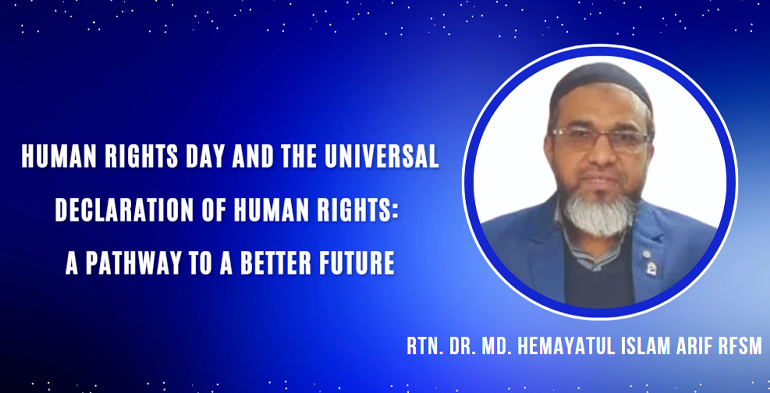
Rtn. Dr. Md. Hemayatul Islam Arif RFSM:
Human Rights Day, observed annually on December 10, serves as a global reminder of the shared dignity and equality of every individual. This day commemorates the adoption of the Universal Declaration of Human Rights (UDHR), a groundbreaking document proclaimed by the United Nations General Assembly on December 10, 1948, in Paris. The UDHR sets forth the inalienable rights entitled to all human beings, regardless of race, color, religion, sex, language, political or other opinion, national or social origin, property, birth, or any other status.
As a "common standard of achievement for all peoples and all nations," the UDHR remains a cornerstone for global justice and equality. It serves as the foundation for international laws, national constitutions, and policies that aim to protect and promote human rights. This year’s theme, “Our Rights, Our Future, Right Now,” emphasizes the pressing need to embrace human rights as a transformative force capable of addressing the challenges of today and building a sustainable tomorrow.
The Legacy of the UDHR
The UDHR represents a pivotal moment in modern history. In the aftermath of World War II, the world witnessed unimaginable human suffering, displacement, and the violation of basic freedoms. Against this backdrop, nations came together to affirm the fundamental principles of human dignity and equality. The Declaration articulated a vision of universal rights, outlining 30 articles that span civil, political, economic, social, and cultural rights.
What makes the UDHR extraordinary is its universality. It transcends cultural, geographical, and ideological boundaries to provide a shared framework for human dignity. Available in 577 languages, from Abkhaz to Zulu, it is the most translated document in history. Its influence can be seen in global treaties, regional human rights instruments, and national constitutions.
Human Rights as a Blueprint for Peace and Development
Human rights are more than abstract ideals; they are practical tools for building just and inclusive societies. The UDHR has served as a bedrock for the 2030 Agenda for Sustainable Development, which envisions a world free of poverty, inequality, and injustice. By linking human rights to sustainable development, the agenda underscores the interconnectedness of individual well-being and global progress.
For example, ensuring gender equality (Article 2) is crucial for achieving economic growth and social stability. Similarly, the right to education (Article 26) empowers individuals to break free from cycles of poverty. Human rights act as both a preventative and transformative force, enabling communities to address the root causes of conflict, inequality, and discrimination.
The 2024 Theme: Our Rights, Our Future, Right Now
This year’s theme highlights the urgent need to reaffirm and uphold human rights as a pathway to solutions. Amid rising challenges such as hate speech, misinformation, climate change, and inequality, human rights provide a framework for collective action and shared responsibility.
- Empowerment Through Rights: Human rights empower individuals to demand accountability and seek justice. When communities understand and assert their rights, they can challenge oppressive systems and create spaces for equality and fairness.
- Combating Hate Speech and Disinformation: The digital age has brought unprecedented opportunities for connection, but it has also facilitated the spread of misinformation and hate speech. Upholding human rights involves protecting freedom of expression while combating harmful rhetoric that divides societies.
- Advocating for Marginalized Communities: Human rights must be a lived reality for all, not a privilege for the few. This involves addressing systemic inequalities and ensuring that marginalized groups have access to resources, opportunities, and platforms to voice their concerns.
Mobilizing Action for a Global Movement
The UDHR is not merely a historical document; it is a living promise that requires active participation. Human Rights Day calls upon governments, organizations, and individuals to reinvigorate a global movement for human rights. This involves:
- Education and Awareness: Schools, universities, and community organizations can play a crucial role in spreading awareness about human rights. Incorporating the principles of the UDHR into curricula can empower young people to become advocates for change.
- Policy Implementation: Governments must translate the principles of the UDHR into concrete policies and laws. This includes strengthening institutions that uphold human rights and ensuring accountability for violations.
- Global Solidarity: Human rights challenges are often interconnected, requiring collaborative solutions. From climate action to refugee protection, global partnerships can amplify efforts to address pressing issues.
A Call to Action
As UN Secretary-General António Guterres aptly stated, “Human rights are the foundation for peaceful, just, and inclusive societies.” This Human Rights Day, we are reminded that the ideals of the UDHR are not abstract aspirations but actionable commitments. Each individual has a role to play in upholding these principles, whether by advocating for justice, challenging discrimination, or fostering dialogue and understanding.
The theme “Our Rights, Our Future, Right Now” is a call to urgency. It is a reminder that human rights are not just about the past or the future—they are about the present. By recognizing the intrinsic value of every individual and addressing inequalities, we can pave the way for a better tomorrow.
Conclusion
Human Rights Day is not just a celebration; it is a call to action. The UDHR, with its enduring relevance and universality, continues to inspire movements for justice and equality around the world. As we reflect on the theme for 2024, let us remember that human rights are more than words on paper—they are the foundation of our shared humanity.
By embracing the power of human rights, we can forge a future that is not only sustainable but also equitable and just for all. Together, we can transform the promise of the UDHR into reality, ensuring that “Our Rights, Our Future” is a legacy we can proudly pass on to generations to come.
Writer: Deputy Chief Veterinarian
Department of Veterinary & Animal Sciences, University of Rajshahi, Bangladesh & President (2023-24), Rotary Club of Rajshahi Central; General Secretary, Bangladesh Livestock Society (BLS); Joint Executive Editor (Bangladesh livestock journal; ISSN 2409-7691); Secretary SHUJON, (Rajshahi Metropolitan), President, BBCF, Rajshahi